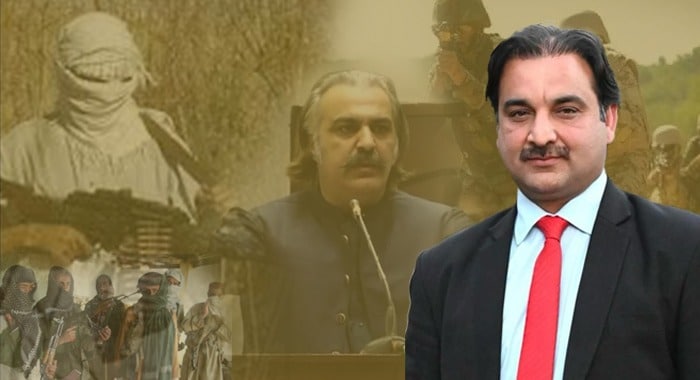The recent motion by Pakistan Tehreek-e-Insaf (PTI) in the Khyber Pakhtunkhwa (KP) Assembly, demanding the withdrawal of the army under Article 245, raises serious concerns. Not just about security policy, but about political responsibility, denialism, and the dangerous game of narrative building being played at the cost of national stability.
Let’s be clear: Article 245 of the Constitution is not some switch flipped lightly. It is invoked when a civilian law enforcement structure is overwhelmed—when terrorism, insurgency, and lawlessness go beyond what police and civil agencies can handle. The irony is that the same PTI that is now seeking the army’s withdrawal was the one that once invoked Article 245 in the first place. If their own government had admitted then that they couldn’t manage the province’s law and order without military assistance, what has changed now? Have the threats vanished, or has political desperation kicked in?
The answer is obvious—and troubling.
For over a decade, PTI governed KP. In that time, it failed to adequately strengthen the province’s security apparatus. While photo-ops and slogans filled social media, the Counter Terrorism Department (CTD) remained underfunded and under-equipped. What happened to the procurement of modern surveillance tools, night vision systems, laser-guided arms, and drones? The region needed counter-terror forces—not just a bloated police force ill-prepared to deal with battle-hardened militants returning from Afghan sanctuaries.
Now, instead of acknowledging this failure, the party is trying to shift blame onto the very institutions holding the province together. Their motion seeks to depict the army’s presence as some kind of overreach—when, in fact, it is a life support system in a province facing a metastasizing militant threat.
Over the last few weeks, KP’s tribal districts have once again become battlegrounds. In Bajaur, Operation Sarbakaf was launched to dismantle entrenched terrorist cells. The operation, now underway in areas like Tehsil Mamund, has already claimed the lives of at least 17 militants, including a commander known as Malang Bacha. Four others have been arrested. Curfews have been imposed for civilian safety—because security forces are going door to door in areas where militant safe havens have become deeply rooted.
These aren’t fabricated threats. On July 17, five Afghan suicide bombers were captured in the Ghulam Khan sector, attempting to cross into Pakistan after cutting through the border fence. These militants weren’t just foreign operatives—they were part of a network with clear operational bases in Afghanistan, a point further validated by a local Malik from Tirah Valley who revealed that negotiations with militants were being directed from across the border.
In another confession, a captured terrorist, Shah Mahmood, confirmed that Afghan nationals were involved in the Karak gas plant attack—plundering weapons and fleeing back across the Durand Line. Whether it’s the devastating attacks in Zhob, Muslim Bagh, or Waziristan, the fingerprints lead to Afghanistan.
So when the Taliban regime in Kabul claims that Afghan soil will not be used against any country—particularly Pakistan—it is not just a false promise. It is a deliberate misrepresentation.
What’s even more alarming is the eerie silence from the federal government. While the situation escalates in KP, the Prime Minister remains conspicuously absent. There are no high-level visits, no emergency meetings, no joint strategy sessions with the provincial leadership. The people of KP are left feeling like they don’t matter—like they’re not even part of the federation.
The federal government’s disengagement appears to stem from political calculus. They have no significant electoral base in KP, so the region gets lip service, not leadership. In contrast, PTI clings to its voter base in KP by playing the anti-establishment card, feeding off social media campaigns fueled by foreign propaganda accounts from countries like India, Israel, and the West. These accounts aren’t just a nuisance—they are part of a coordinated attempt to erode public confidence in Pakistan’s security institutions.
Given the internal decay of the police force, the unpreparedness of the CTD, and the scale of the cross-border threat, the presence of the military is not a choice—it is a necessity. PTI’s motion in the KP Assembly is not just poorly timed; it is reckless. It’s a dangerous ploy that serves political optics but compromises public safety.
Calls to end military deployment without presenting a viable civilian alternative are tantamount to abandoning KP to the militants. If PTI truly believes the province can be defended without the army, let them first explain how they’ll fund, equip, and train a counter-terrorism force capable of confronting what is effectively a transnational insurgency.
The Chief Minister spends more time in Islamabad than in volatile districts like Tirah. The IG Police is missing from action. Administrative paralysis, political hypocrisy, and federal disinterest make the military’s role more vital than ever.
Security is not a partisan issue. It is a national one. We need an all-party conference, not point-scoring. The Prime Minister must lead from the front—visit KP, meet the people, consult the army, and offer a united vision.
If PTI is serious about peace, let it move from motions to solutions. If the federal government wants stability, it must stop ignoring KP and start owning it. And if Pakistan is to overcome this new wave of militancy, all institutions, civilian and military, must be empowered, resourced, and supported, not undermined.
Until then, removing the military under Article 245 is not just unwise—it’s suicidal.





